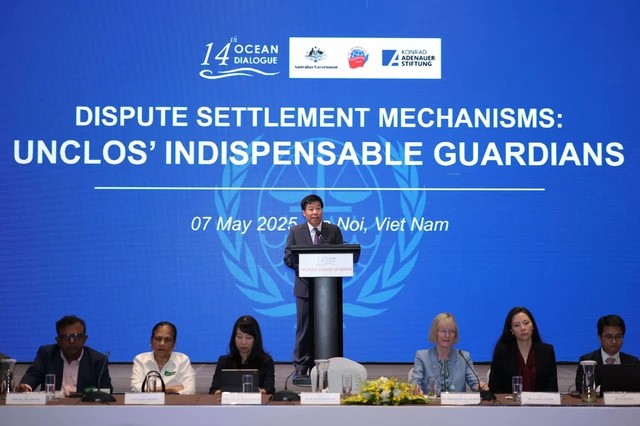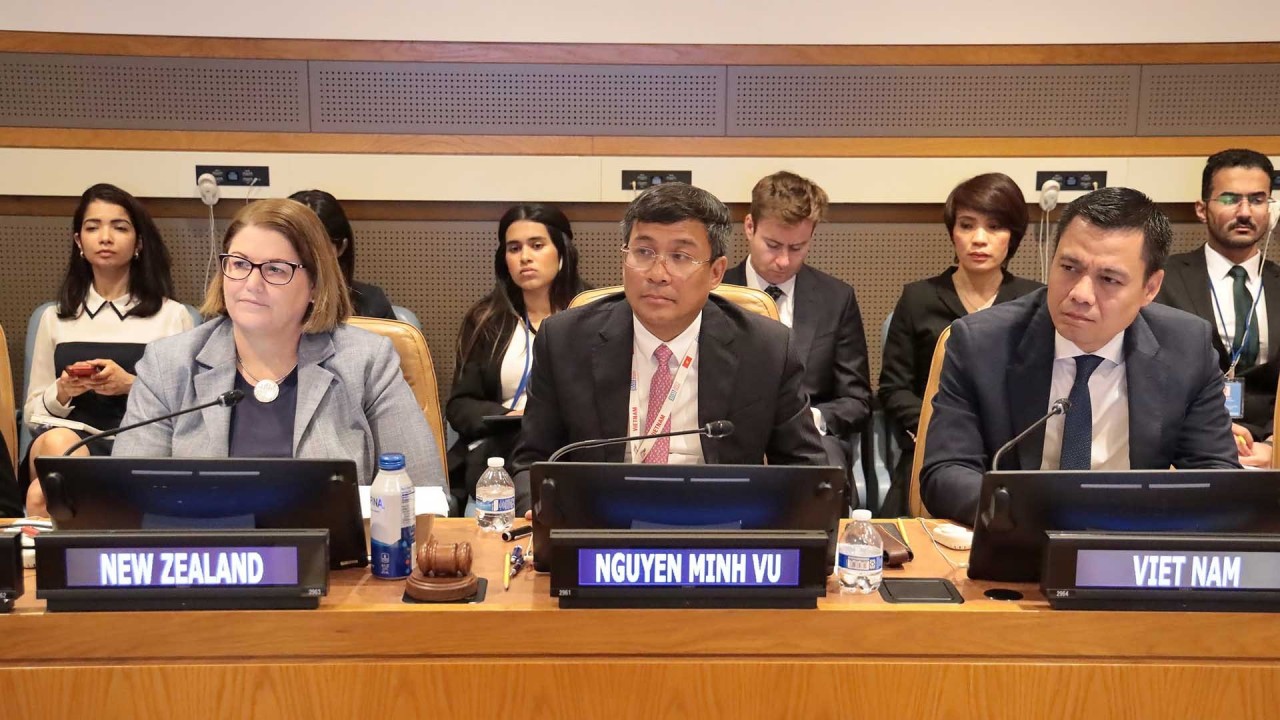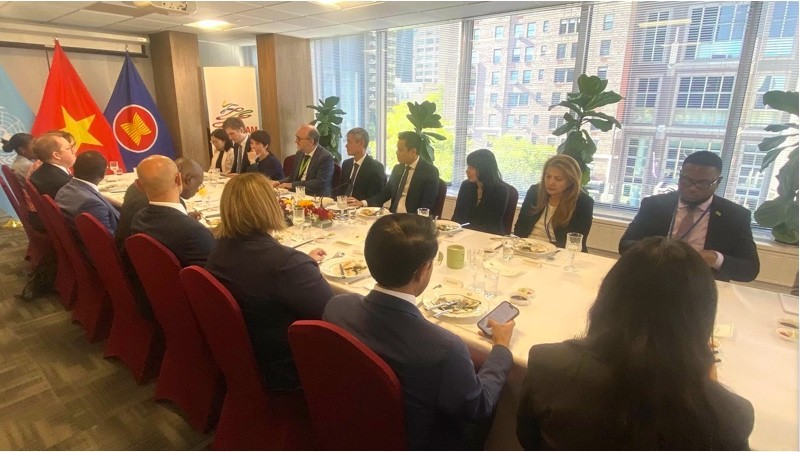South China Sea Plays an Important Role in Global Peace and Prosperity
The South China Sea International Conference is an important annual event, co-organized by the Diplomatic Academy of Vietnam with domestic and foreign partners with co-sponsors. This year, the Conference lasted for 2 days with 8 discussion sessions, 1 introductory session, nearly 40 papers, and more than 160 comments.
In the context of the complicated and unpredictable world situation, this year's Conference with the theme "Sea of Peace - Sustainable Restoration", focused on discussing the central and connecting role of the South China Sea as well as solutions to challenges posed to the Sea. The following are some of the major topics discussed by scholars at this Conference.
South China Sea: "Temporary Calm"
Assessing the situation in the South China Sea and the region, many people think that in the context of many unexpected changes, the situation in the region is relatively calm but this may only be temporary.
Accordingly, the security situation in the region and the South China Sea is related to the countries bordering the Sea, and at the same time related to competition between major powers. The South China Sea is affected by many factors such as global and regional geopolitical context, motives of great powers, and competition amongst major powers.
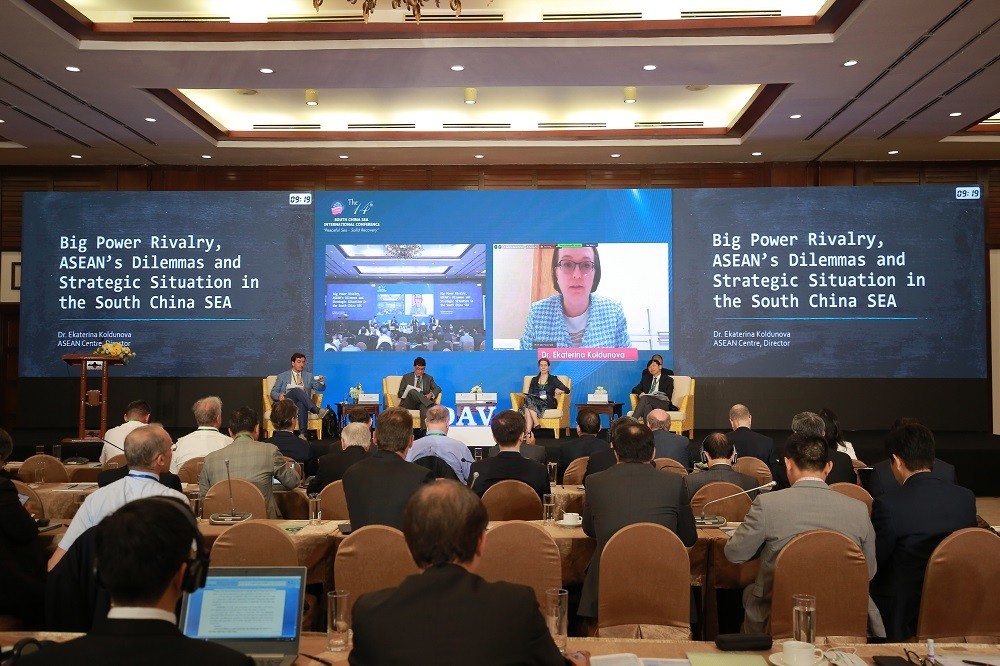 |
| The international conference on the South China Sea is an opportunity for international scholars and researchers to meet, exchange information, and share views on many aspects related to the South China Sea. (Photo: TGVN) |
Geopolitical changes in the world and some regions as well as the relations among major countries may lead to a change in perceptions and policies in the way of handling relations with major countries from the countries and organizations such as the Association of Southeast Asian Nations (ASEAN) and the European Union (EU).
At the same time, the scholars affirmed that the Indo-Pacific in general, and the South China Sea, in particular, are becoming the concerns of many countries around the world. Countries such as the UK, France, India, etc., or organizations like the EU, are proactively setting out their strategies in the region and affirming their commitment to increasing engagement in the region.
In the opening session on the morning of November 16, according to Rear Admiral Juergen Ehle, Senior Military Advisor of the EU External Affairs Service, the Indo-Pacific is an important region for the EU in terms of economics, commerce, freedom of navigation and overflight. He affirmed that the EU opposes unilateral actions, protects the rules-based order, does not use or threatens to use force, is committed to maintaining security, and building a rules-based order at sea, in which UNCLOS sets out the legal framework for all activities in the seas and oceans.
At the same time, the EU supports the central role of ASEAN, a rules-based regional architecture, multilateralism, and security through the Asian Regional Forum (ARF), as well as the development of a Code of Conduct in the South China Sea (COC) for legal bind and securing the interests of third parties. According to him, in the coming time, the EU will deploy the initiative of “integrated presence” at sea in the Indo-Pacific.
For her part, the British Minister of State Anne-Marie Trevelyan assessed the region as having an important role for Britain in terms of economy, respecting international law and standards on free trade, security and stability. In particular, the South China Sea plays an important role in ensuring global peace and prosperity.
The UK recognizes ASEAN's central role as the newest dialogue partner and supports efforts to ensure maritime security and tackle climate change. At the same time, the UK will promote maritime security cooperation through a comprehensive program to strengthen regional self-reliance and promote a strong, stable, and secure South China Sea.
| Scholars affirmed that the Indo-Pacific in general and the South China Sea in particular are becoming the concerns of many countries around the world. Countries such as the UK, France, India, etc., or organizations like the EU, are proactively setting out their strategies in the region and affirming their commitment to increasing engagement in the region. |
The Trend of Sub-multilateral and Multilateral Linkages
The speakers and delegates also discussed the trend of sub-multilateral and multilateral linkages, including mechanisms led by ASEAN.
Some argued that more and more cooperation mechanisms are emerging among small groups of countries. This is caused by emerging challenges in ensuring the enforcement of international law and the effectiveness of current multilateral institutions; as well as the flexibility and ease of reconciling the perspectives and interests of these mechanisms.
However, scholars still held different ideas on the impact of sub-multilateral cooperation mechanisms on ASEAN centrality. Some argued that mechanisms such as the Quad or sub-regional cooperation can complement those led by ASEAN, while some concerned that sub-multilateral frameworks could undermine ASEAN's centrality.
Notably, many delegates suggested that countries should develop mechanisms to "reassurance" and "ensure" each other, to implement sub-multilateral cooperation in an open, transparent and inclusive manner. These mechanisms should strengthen dialogue between ASEAN and its dialogue partners, respect the principles and central role of ASEAN in regional architecture and cooperation in regional and sub-regional development, and resonating development strategies to complement each other.
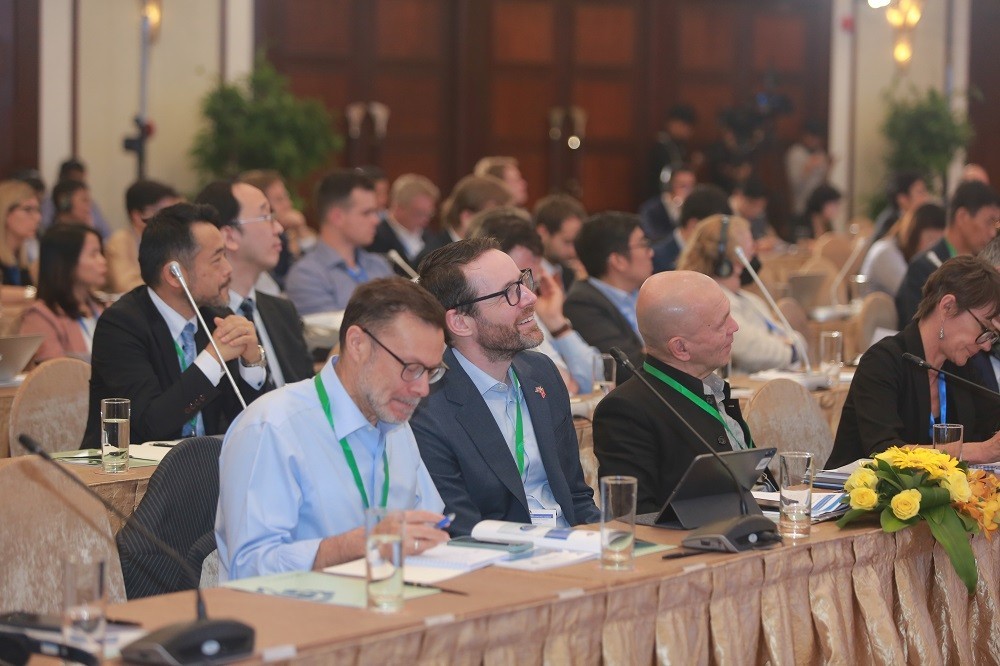 |
| Speakers and participants emphasized the importance of the South China Sea and the current situation and made several proposals for building a strong and stable South China Sea, regulation, and security. (Photo: TGVN) |
Two Key Milestones
At the Conference, scholars also attended the session celebrating the 40th anniversary of the signing of the 1982 United Nations Convention on the Law of the Sea (UNCLOS) and the 20th anniversary of the signing of the Declaration on the Conduct of Parties in the South China Sea between ASEAN-China (DOC).
Most scholars affirmed the importance and universal value of UNCLOS, also known as the "Constitution of the Oceans". In fact, after 40 years of signing, many new issues arise such as environmental protection, marine biodiversity protection, climate change, development of science and technology... are challenging the role of UNCLOS.
However, it is believed that the new challenges can be completely solved within the legal framework of UNCLOS and implementing agreements within the framework of UNCLOS. Besides, the rulings of the tribunals also contribute to clarifying the interpretation and enforcement of international law.
At the same time, many scholars considered the DOC an important cooperation achievement between ASEAN and China, showing that despite existing differences, parties can work together to find commonalities for mutual interests. DOC marks the beginning of joint efforts, promoting cooperation in the region. It is also the basis for the consultation process on the future Code of Conduct in the South China Sea (COC).
Challenge and Opportunity
At the Conference, delegates also discussed recent developments in the South China Sea such as the taking advantage of unclear provisions in international law and developments in science and technology by some countries to conduct activities that affect the interests of coastal states and the order in the Sea.
Regarding the new challenges to maritime security, many scholars believed that the sea is not a separate space but is very close to the land, airspace, seabed, and undersea land and connecting with non-traditional space such as cyberspace in the context of growing science, technology, and artificial intelligence.
These should be taken into account in promoting cooperation to develop regulations to ensure safety and prevent collisions, thereby ensuring security and peace at sea.
| Many scholars considered the DOC to be an important cooperation achievement between ASEAN and China, showing that despite existing differences, parties can work together to find commonalities for mutual interests. DOC marks the beginning of joint efforts, promoting cooperation in the region. It is also the basis for the consultation process on the future Code of Conduct in the South China Sea (COC). |
Scholars believed that the green economy or marine economy plays an increasingly important role in promoting creativity, making good use of resources, and coping with climate change, promoting economic growth and sustainable development of many countries, promoting multilateralism.
Therefore, many countries and regional organizations such as the EU or ASEAN prioritize the development of blue sea economic cooperation and cooperation at sea after the Covid-19 pandemic to promote connectivity and ensure supply chains and economic recovery.
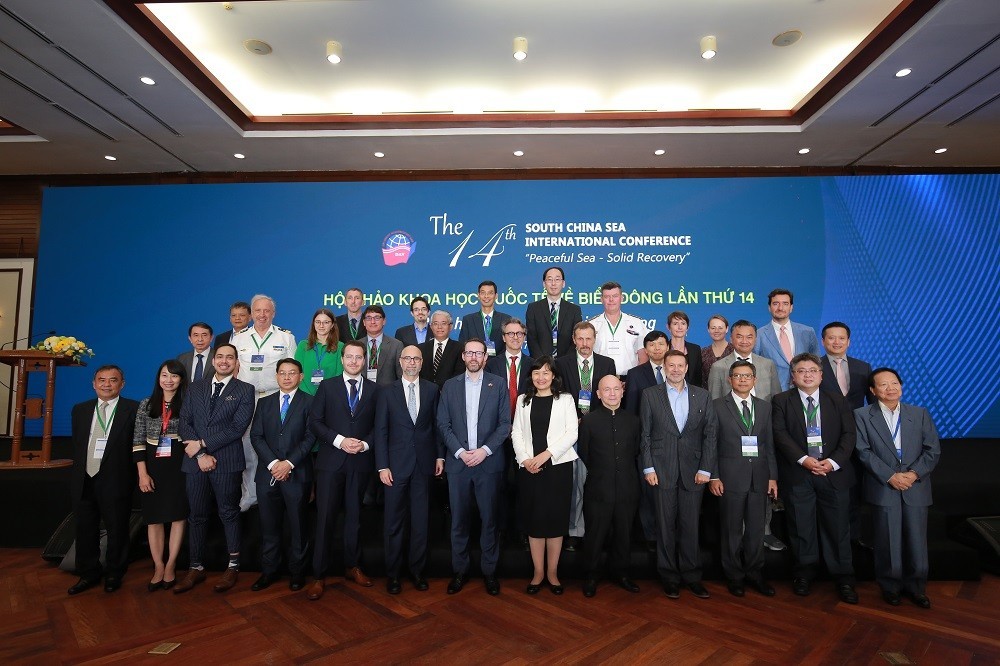 |
| Delegates and speakers attending the seminar took souvenir photos. (Photo: TGVN) |
In the Conference, some delegates shared that in the cooperation and development of the blue sea economy, ASEAN and its partners will also face some difficulties such as the lack of a foundational framework or the lack of financial resources. At the same time, the unresolved disputes in the South China Sea will also be a core obstacle in realizing the blue sea economic strategy.
On a global scale, the Covid-19 pandemic, the Russia-Ukraine conflict, and the US-China trade competition have also had profound impacts on the global economy in many specific industries such as the semiconductor supply chain and sea transport.
In that context, countries, and regions need to strengthen their autonomy and independence, diversify supply chains, enhance seaport and shipping services, and expand cooperation to minimize the impact of disruptions of supplies of raw materials, semiconductors, key minerals, and green and clean technology. At the same time, countries should take advantage of their strengths to promote economic cooperation and encourage the participation of public and private enterprises in the model of socialization.
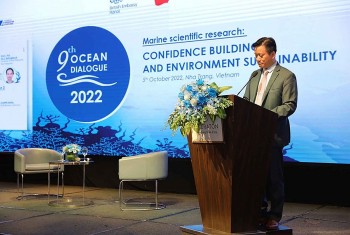 | 9th Ocean Dialogue Spotlights Marine Scientific Research in South China Sea The 9th Ocean Dialogue with the theme "Marine Scientific Research: Confidence Building and Environment Sustainability" was held in Nha Trang on October 5. The dialogue ... |
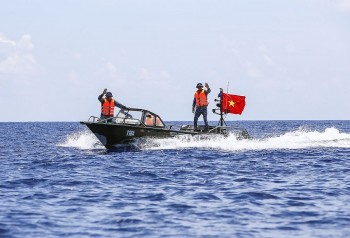 | UNCLOS 1982: Solid Legal Foundation for Vietnam to Protect National Interests On the 40th anniversary of the e adoption of the United Nations Convention on the Law of the Sea (UNCLOS) 1982 and the 10th anniversary of ... |
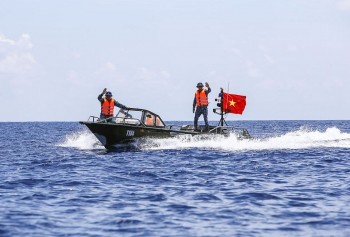 | Upholding Rule of Law: Necessary Measure to Solve South China Sea Issue The South China Sea Arbitration is the legal basis to assert that China's "nine-dash line" claim is completely baseless and illegitimate according to 1982 ... |
Recommended
 Seas and islands
Seas and islands
Vietnam Endorses Common Voice on Ocean Jurisdiction
 Seas and islands
Seas and islands
RoK Navy Ship Pays Friendly Visit to Da Nang City
 Seas and islands
Seas and islands
Naval Region 5 Promotes Reading Culture, Fosters Patriotism
 Seas and islands
Seas and islands
Coast Guard Region 2 Command Hosts Philippine Coast Counterpart
Popular article
 Seas and islands
Seas and islands
Vietnam - Thailand Navy: Coordination to Well Address Problems at Sea
 Seas and islands
Seas and islands
Honoring the Fallen: Incense Offering for the 37th Anniversary of Gac Ma
 Seas and islands
Seas and islands
Vietnam Coast Guard Expands International Cooperation for Maritime Security
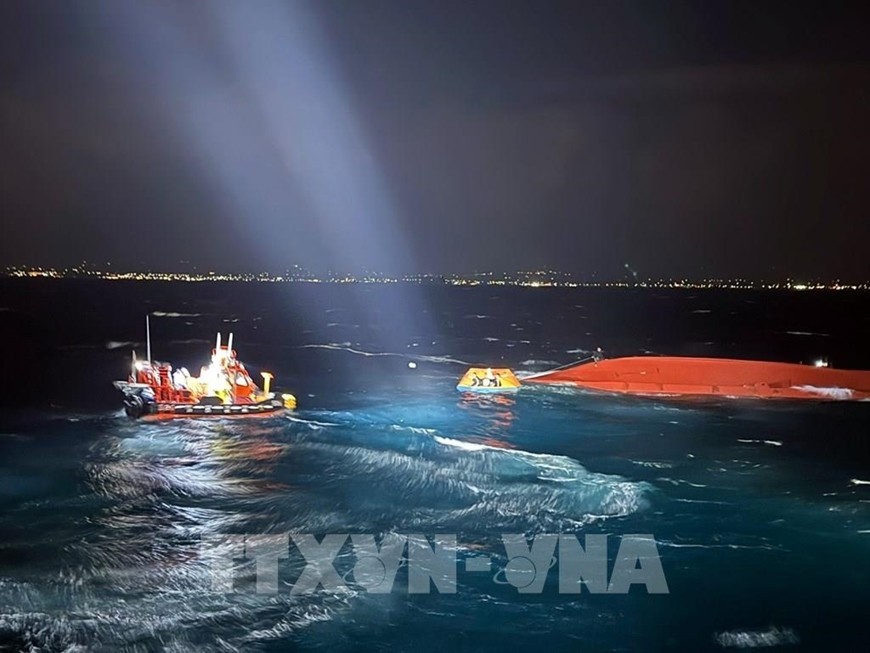 Seas and islands
Seas and islands





